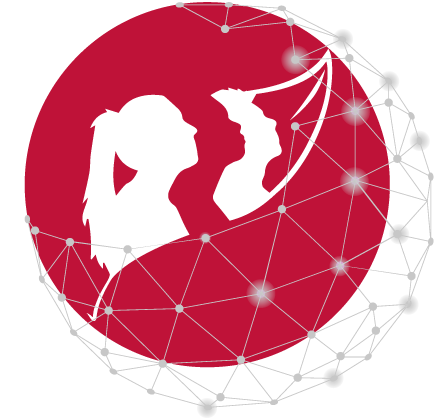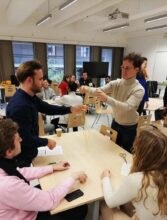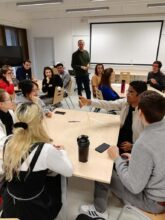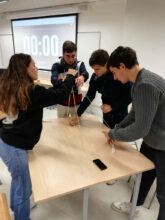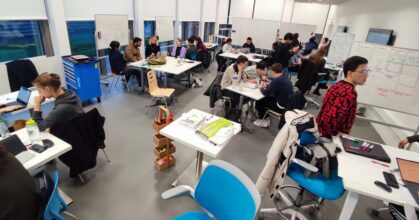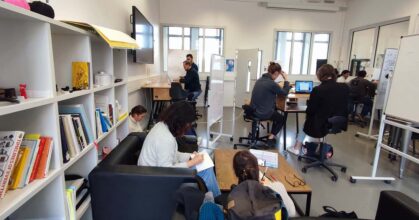Over 300 incoming and outgoing exchanges!
Organized within the framework of the Athens, which includes 15 of Europe’s top technological universities and 7 of France’s most prestigious engineering schools, this week offers a unique opportunity to take a course at another university, particularly abroad.
A high level of participation
This year, we welcomed students from 13 of the network’s 15 partner universities, from Austria, Belgium, the Czech Republic, Germany, Greece, Hungary, Italy, the Netherlands, Norway, Poland, Portugal, Spain and Turkey. The largest cohorts of students came from the Technische Universität München (Germany), Warsaw University of Technology (Poland), Instituto Superior Tecnico (Portugal) and Czech Technical University (Czech Republic).
On Monday November 20, international students and students from the other French Grandes Ecoles were welcomed by the Education and the International Relations Departments, who presented our campus and the 8 courses offered during the Athens week at Telecom Paris.
This year, over a third of Telecom Paris participants went to study at 9 of the European partner universities of the Athens network in Belgium, the Czech Republic, Germany, Hungary, Italy, Poland, Portugal, Spain and Turkey. Many of them have chosen the Czech Technical University in Prague, Czech Republic, the Universidad Politecnica in Madrid, Spain and the Instituto Superior Tecnico in Lisbon, Portugal.
Many students stay in France to take a course at one of the network’s 6 other partner French engineering schools, giving them an insight into subjects quite different from those taught on our campus. AgroParisTech, Ecole des Ponts, ENSAM, IOGS, Les Mines and Chimie ParisTech are all very popular with our students. A large proportion of the students remaining in France are already international students on double degree or exchange programs in the engineering curriculum. The latter can even choose one of the Athens courses offered on our campus.
Students benefited from travel assistance (train or plane tickets) from the International Relations Department, on request.
Courses offered
This year, students could choose from the following 8 courses:
Image processing – Florence Tupin
This course is an introduction to digital image processing techniques and applications, from a fundamental, algorithmic and practical point of view.
Communication in an international context – Zachary Oberg and Verena Galganek
Both theoretical and practical, this course offers an overview of strategies for overcoming potential communication problems in an intercultural context. It focuses on developing the interpersonal skills essential for establishing good relations and avoiding conflict.
Photographs Verena Galganek
Emergence in complex systems, from nature to engineering – Jean-Louis Dessalles
This course explores the conditions necessary for stable social behavior. Students use computer simulations to study cooperation, coordination, sharing, collective problem-solving, communication and more. They apply several theoretical models – including kin selection, reciprocity and social signaling – to explain these phenomena.
From cloud datacenters to mobile edge computing (MEC): architectures, innovative services, and open challenges – Maurice Gagnaire
The course presents the fundamental concepts, application domains and open research topics inherent in cloud computing, both for large-scale data centers and in the mobile edge environment.
Large-scale machine learning practice – Enzo Tartaglione and Attilio Fiandrotti
This course introduces students to the basics of machine learning: regression and classification with multi-layer sigmoid networks. Students experiment with deep convolutional networks for image classification and applications.
User experience design sprint / Designing a solution from the user’s point of view – Samuel Huron and Tallulah Frappier
Most engineers learn to design a system, application or service from a technical point of view. In this course, students learn to design a solution from the user’s point of view, through a hands-on approach. In five days, students produce a project. This complete design course provides students with a first overview, enabling them to know what skills to acquire later on.
Day 1: students formalize a problem based on a brief from an industrialist or researcher.
Day 2: they produce sketches of multiple solutions.
Day 3: they refine their design intentions and make decisions concerning the different levels of the project.
Days 3 and 4: they prototype the project and design a mini user study.
Day 5: They pilot and deploy their study, then analyze the data collected. Finally, they formalize their results to improve their design.
Photographs Samuel Huron
Mediating international and scientific communication – Bethany Cagnol
In this interactive course, students explore different ways of mediating the sharing of scientific experience and knowledge, drawing on key communication models. Students practice breaking down complex information, communicating in delicate situations, leading question-and-answer sessions and adapting their message in media interviews. This course is based on the MOOC « Promote your Scientific Results » (Coursera) – IMT/Telecom Paris.
Formal methods: formal systems specification and verification – Rabéa Ameur-Boulifa
This course is an introduction to the vast field of formal methods. The word « formal » means using a formal language, so that the system’s operating logic can be verified by a machine. The course provides benchmarks that enable students to specify, develop, verify and validate systems in a systematic rather than ad hoc way.
Testimonials
One of the highlights of campus life at Télécom Paris for many years, the 2023 edition of Athens Week was well attended by engineering students. Many of them expressed their interest in the program, which can inspire the desire for longer-term international mobility: one or two semesters of exchange, or even a master’s degree or international double degree (Telecom Paris students are required to spend one semester abroad during their engineering studies).
A few feedbacks following the course on Communication in an international context:
-« I think I am more aware of what is culture and what form it can have. Some of it is not that visible but still effective on behavior of people. »
-« Through today’s class I was able to realize how complex some of my actions and thoughts actually are and that most of them derive from the way I was brought up. It is very interesting to begin to deconstruct these actions and thoughts so they can start to be rebuilt in a different way. »
– « I really enjoyed this course and how you were able to create a safe space for all this open communication! Also the games and roleplays made it a lot more interactive than a pure theoretical course would have done. That helps with reflecting on your own behaviour and actually remembering what we have learned. »
– « I really enjoyed the game this morning, because it shows the importance of adaptation and communication in a group. It was funny to see people not understanding why they were losing and trying to explain to them we hadn’t the same rules without talking. I also enjoyed learning about new cultures and deconstruct stereotypes this afternoon. It fostered respect and understanding skills between us. I’ve learned that it is possible to share things with someone without talking. »
Find out more about the Athens network and the Athens Week in November
The Athens network (Advanced Technology Higher Education Network/Socrates), set up in 1996, aims to facilitate exchanges of students, professors and researchers between leading European universities, schools and technology institutions. The network’s flagship action is a program of intensive week-long courses at each member institution.
Télécom Paris takes part in the session organized during the 3rd week of November. Participants take 30 hours of scientific courses, plus 10 to 15 hours of socio-cultural activities for those going to an institution outside their own country. Each complete session is validated by a knowledge test and is worth 3 ECTS credits.
